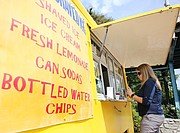Forecasters are warning of scorching heat this week across a wide stretch of the U.S. South and Midwest, where it will feel as high as 117 degree in some spots.
Parts of 13 states were under heat advisories Monday, including Tennessee, Georgia and Alabama, the National Weather Service reported.
Here's what you need to know:
JUST HOW HOT WILL IT BE?
While it won't be as hot here as it will be in Arkansas and Oklahoma - which were expected to have heat indexes over 115 - the Chattanooga region is going to see some extreme temperatures.
Like Monday, heat and humidity again will make for dangerous heat indexes on Tuesday.
FIVE-DAY FORECAST
TUESDAYHotHigh: 96Low: 76WEDNESDAYScattered showers and stormsHigh: 93Low: 70THURSDAYPartly cloudy, less humidHigh: 94Low: 70FRIDAYMostly sunny and hotHigh: 94Low: 71SATURDAYMostly sunny, and hotHigh: 93Low: 71
Tuesday's high in the Chattanooga area is expected to be in the mid- to upper 90s with a heat index of 102-106, according to WRCB-TV Channel 3 Chief Meteorologist Paul Barys.
However, an approaching cool front should help ease the intense heat by Wednesday.
"The Storm Prediction Center says some of these storms could turn severe with winds to 60 mph Tuesday night," Barys said Monday on his weather blog. "The best chance will be north of Chattanooga."
Until then, "if you're going out in the summer, prepare for the worst,"said Gary Chatelain, a National Weather Service meteorologist based in Shreveport, Louisiana, said.
Heat exhaustion and heat stroke are among the main threats. Seniors and children are especially vulnerable.
"You are more likely to develop a heat illness quicker in this type of weather, when it's really humid and hot," Chatelain said.
(Read more: A guide to the Chattanooga area's 9 most unique swimming holes)
WHAT IS HEAT STROKE?
Heat stroke, a serious illness that can cause death or permanent disability, occurs when the body becomes unable to control its temperature due to overheating. Symptoms include fever, red skin, trouble sweating, elevated pulse, headache, dizziness, nausea, confusion and fainting.
Home Instead Senior Care, a home-care service based on Bonny Oaks Drive, offer these tips to avoid getting heat stroke or other heat-related illness:
- Take preventive health measures, like preparing for summer heat exposure by choosing protective clothing. The Mayo Clinic recommends wearing loose-fitting, lightweight clothing to allow the body to better cool itself naturally. Adding a broad-brimmed hat or cap can also help keep internal temperatures low and protect from sunburn - a condition that heightens the risk of heat stroke by lessening the skin's ability to regulate heat.
- Plan ahead to avoid strenuous activity during the hottest parts of the day. Many activities such as running errands or visiting friends and family members can be rescheduled for the morning or evening hours, when temperatures are cooler and the sun's rays are less direct. If the time cannot be adjusted, stay hydrated and rest frequently in a cool area to avoid the increased risk of overheating.
- Pay attention to symptoms of heat-related health problems. The University of Connecticut found that older adults are the most susceptible demographic to dehydration due to reduced kidney function that occurs naturally as we age, as well as the frequent use of diuretics often taken for high blood pressure, according to AARP. Be aware of muscle cramps, dizziness, headaches, constipation or impaired memory or concentration function. Also monitor for heat stroke, which can present itself through high body temperature, confusion or slurred speech, flushed skin, rapid breathing and a headache.
- Take action to cool someone experiencing heat-related symptoms. Once a symptom is identified, immediate action is critical to treat the senior and prevent escalation in the reaction. The Mayo Clinic shares three steps:
- Get the person in the shade, indoors and out of the heat
- Remove any excess clothing to help the body breathe
- Cool the person with whatever means available (e.g. place a wet towel on the person's head, neck or armpits or submerge the individual in cool water)
- Monitor and/or assist with medications. Some prescribed medications may affect a senior's natural ability to stay hydrated and dissipate heat. Talk with your senior and their doctor about any increased risks assumed by taking these types of medications.
KEEPING VULNERABLE POPULATIONS SAFE
As the heat settles in, the Salvation Army is extending its hours for its day shelter on McCallie Avenue.
It has an air-conditioned space where people can go to get out of the heat. It also has a "hydration station."
At the East 28th Street location, Salvation Army workers are distributing box fans and bottled water to low-income people. The swimming pool is also open there.
"When temperatures get this high, it can be life-threatening," said Salvation Army spokeswoman Kimberly George. "The Salvation Army wants to be available to all displaced neighbors and low-income neighbors to help them beat the heat. But we can only do it with the community's support."
The Salvation Army is accepting monetary donations and donations of cases of water and new box fans.
At the Chattanooga Community Kitchen, which is open daily from 7 a.m.-5 p.m., staff are making sure they have plenty of bottled water, including some frozen. They also have a daytime cooling area.
"Hydration is very important, especially for people that are trying to find jobs and housing and walking so much," Community Kitchen CEO Jens Christensen said, noting high temperatures increase the number of people stopping by the facility.
HOW BAD IS HEAT FOR PETS?
Just like humans, hot weather provides plenty of health risks for animals, and each year, household pets die as a result of heat stroke.
The American Society for the Prevention of Cruelty to Animals offers these tips for keeping your furry friends safe from the heat:
- Give them plenty of fresh, clean water.
- Make sure your pets have a shady place to get out of the sun
- Be careful not to over-exercise them
- Keep them indoors when it's extremely hot
- Know the symptoms of overheating in pets, which include excessive panting or difficulty breathing, increased heart and respiratory rate, drooling, mild weakness, stupor or even collapse. Symptoms can also include seizures, bloody diarrhea and vomit along with an elevated body temperature of over 104 degrees.
- Animals with flat faces, like Pugs and Persian cats, are more susceptible to heat stroke since they cannot pant as effectively. These pets, along with the elderly, the overweight, and those with heart or lung diseases, should be kept cool in air-conditioned rooms as much as possible.
- Never leave animals alone in a parked vehicle. Not only can it lead to fatal heat stroke, it is illegal in several states.
The Associated Press contributed to this story.

